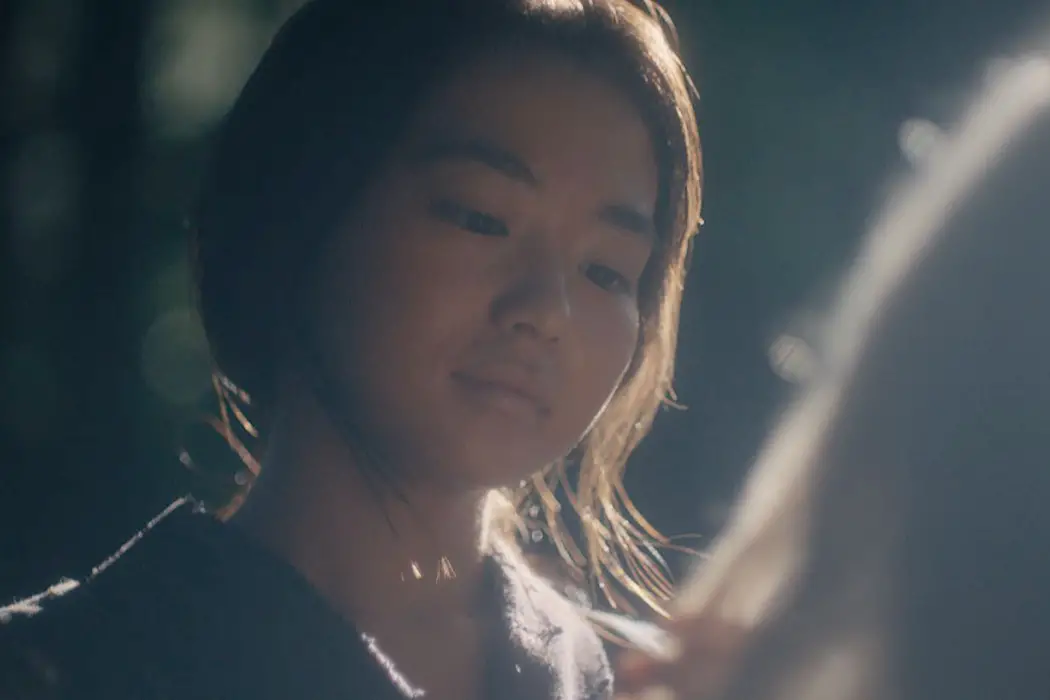New York Asian Film Festival 2023: MOUNTAIN ONION, NOMAD (DIRECTOR’S CUT), MOUNTAIN WOMAN

Lee Jutton has directed short films starring a killer toaster,…
An eccentric Kazakh comedy about a family falling apart, a re-released version of an influential Hong Kong classic, and a Japanese period drama about an outcast woman’s emancipation walk into a bar—except instead of a bar, it’s 2023 New York Asian Film Festival. Read on for my thoughts on three of the standout films in this year’s lineup.
Mountain Onion (Eldar Shibanov)
The debut feature from writer-director Eldar Shibanov, Mountain Onion (Gornyi Luk) follows an eleven-year-old boy and his younger sister on a madcap quest to save their parents’ failing marriage. Shot in stunning widescreen to showcase the rolling green hills and wide blue skies of rural Kazakhstan—a place populated with characters as quirky and vibrant as their mismatched wardrobes—Mountain Onion perfectly captures that specific period of time in childhood when you’re observing so much more than the adults around you think you are; you just don’t quite understand exactly what it all means. (But, someday, you will.)

Jabai (Esil Amantay) and Saniya (Amina Gaziyeva) sell mountain onions on the side of the highway to help their parents make ends meet. Father (Kuantay Abdimadi) is attempting to build a house of dried dung brick to replace the family’s yurt, while mother (Laura Tursunkanova) longs to return to a more refined life in the big city; she takes out her frustration on her husband, insulting his manhood before serving him with divorce papers. After Jabai accidentally spots his mother having a romantic tryst with Vitya (Sanjar Madi), a truck driver who imports goods from China to their small village, he becomes determined to save his parents’ marriage by helping his father become a stronger man. How does he plan on doing this? By sneaking aboard Vitya’s truck, venturing into China, and obtaining a magical product Jabai believes will do the trick: Golden Viagra.
What follows is a zany journey across the border—with Saniya in tow—to what Vitya refers to as “the greatest civilization. There’s no problem they can’t solve.” But the problem of fixing a failing marriage requires a more complex solution than a black-market sexual enhancer from China. Throughout the film, all of the various characters in Mountain Onion wrestle with what it truly means to be a man—a concept that is not as straightforward as they initially seem to think it is. (For Jabai personally, becoming a real man means getting his first erection. Remember, he is eleven.)

Mountain Onion is, fittingly, a family affair; in addition to the director’s brother, Dias Shibanov, serving as cinematographer, their mother Yuliya Levitskaya serves as co-writer and producer. Together, they tell a rich tale full of everyday life’s inherent absurdity, packed with specific details that help the audience gain an immediate understanding of this particular little world. Characters are often shot indirectly—at unusual angles, or in mirrors—which gives one the feeling of being a voyeur spying on their shenanigans. Everyone in the film is dressed in unusual, colorful ensembles that one imagines fell off of Vitya’s truck; the mother basically only wears safety orange, including a skintight catsuit and a sexy one-piece bathing suit, while the father pairs pastel blazers with baggy shorts. (Vitya himself walks around in knock-off T-shirts blazoned with brand names like ABIBAS, which still carry quite a bit of cache in their little village.) Boasting great performances from all involved—especially Amantay as our pint-sized hero—Mountain Onion is a true treat that signifies Shibanov and family as a team to watch in world cinema.
Nomad (Director’s Cut) (Patrick Tam)
Originally released in 1982, Patrick Tam’s landmark Hong Kong New Wave film Nomad is screening at this year’s NYAFF in a new director’s cut; forty years later, it has lost none of its potency. A moody coming-of-age story with neo-noir trimmings, Nomad features a star-making performance from a painfully young and beautiful Leslie Cheung, turning the already elegiac film into a tragic reminder of how much we lost upon his untimely passing in 2003.
Rich boy Louis (Cheung) lies around his family’s luxurious home listening to tapes of his dearly departed mother’s radio broadcasts and commiserating with his fun-loving cousin, Kathy (Pat Ha). Kathy previously spent some time in Japan, leaving behind a boyfriend named Shinsuke (Yung Sai-kit) who happens to be a member of the Japanese Red Army. This past will come back to haunt her in the form of an AWOL Shinsuke and the Red Army assassins who have come to Hong Kong to hunt him down.

However, before the story takes this tragic turn, Kathy falls in love with working-class Pong (Kent Tong)—a playful seduction scene between the two of them on a public bus is one of the sexier things I’ve seen in movies in quite some time—while Louis ends up in a relationship with a pretty girl inexplicably called Tomato (Cecilia Yip). Together, this quartet of attractive and adventurous young lovers spends time hanging out, sailing on a boat belonging to Louis’ father (the Nomad of the title), and musing about what the future may hold. None of them can anticipate the brutal, bloody violence that will turn their lives upside down upon Shinsuke’s sudden arrival in their insular little world.
The four lead actors in Nomad are all ridiculously good-looking and naturally talented, embodying the devil-may-care attitude of their characters so well that it’s easy to believe that they’re simply playing themselves. Still, it’s Cheung whose presence immediately seizes your attention and refuses to relinquish it, even while doing something as simple as lying in bed listening to his mother’s voice on tape. Even if you aren’t already familiar with his acclaimed work in films like Wong Kar-wai’s Happy Together and Chen Kaige’s Farewell, My Concubine, it’s clear while watching Nomad that this handsome young man was meant to be a star.

Dramatically seesawing between slow-moving scenes of languorous dialogue and frenetic sequences of surprising action, Nomad never does what you expect. Gorgeously shot by three credited cinematographers who capture the neon-lit nighttime streets and the sun-drenched island shores with equal mastery, it’s a strange yet undeniably affecting film that serves as a prime example of everything exciting about the Hong Kong New Wave.
Mountain Woman (Takeshi Fukunaga)
Directed by Takeshi Fukunaga, Mountain Woman takes place in a small village in the Tohoku region of Japan during the 18th century when the country was plagued with a deadly famine after a volcanic eruption filled the sky with ash and blocked out the warmth of the sun. Sounds fun, right? Yet what is by far the bleakest film I saw at this year’s NYAFF also happens to be one of the most rewarding if you’re able to wallow through all of the doom and gloom to the end.

Rin (the magnificent Anna Yamada) is the eldest daughter of an outcast family; with a history of ancestral shame and almost zero land to their name, the family is instead saddled with all of the most undesirable work in the village, including disposing of babies killed at birth due to the lack of food to feed them. Indeed, that’s what happens in literally the first scene of Mountain Woman, setting up the disturbingly depressing world in which Rin and the rest of the characters can do very little but just try to survive. It’s a harsh world full of societal repression, one that pins the crimes of the past on individuals in the present with little in the way of empathy.
After Rin takes the blame for a crime committed by her father (he rewards her for this by brutally beating her), she flees to Mount Hayachine, where it is said the spirits of the deceased reside. Whereas the other villagers fear the mountain and avoid crossing the boundary line surrounding it, Rin draws strength from its presence. Here, she meets an old man who has managed to not only survive but thrive in this strange, surreal world; alongside him, she finally learns how to do the same. But her peace is unfortunately short-lived, for a seer has declared that the village is cursed and can only be saved by sacrificing a virgin girl to the weather god. (Toko Miura of Drive My Car fame excels in a supporting role as a young woman who seduces the kindhearted local messenger in order to save herself from any potential sacrifice.)

You can probably guess who is chosen for the sacrifice; what you won’t guess is what happens next, culminating in a stunner of an ending that refills the reserves of hope that the rest of the film has drained away. It’s all beautifully captured in all-natural light by cinematographer Daniel Satinoff, who renders Rin’s world a chilly sea of blues, greens, and greys. Yamada’s performance is all the more powerful for its remarkable stillness; when Rin finally does break down, it’s so startling that her desperation cannot help but cut deep. Her stoic spiritualism protects her from the cruelties of the world; it’s also why she’s the only person in the village who sees Mount Hayachine as a symbol of hope, as opposed to fear. Her strength is what powers Mountain Woman and makes it a film worth watching.
The 2023 New York Asian Film Festival runs from July 14-30 at Film at Lincoln Center in New York, with a special weekend of screenings July 21-23 at the Barrymore Film Center in Fort Lee, New Jersey. Learn more about this year’s lineup and purchase tickets here.
Does content like this matter to you?
Become a Member and support film journalism. Unlock access to all of Film Inquiry`s great articles. Join a community of like-minded readers who are passionate about cinema - get access to our private members Network, give back to independent filmmakers, and more.
Lee Jutton has directed short films starring a killer toaster, a killer Christmas tree, and a not-killer leopard. Her writing has appeared in publications such as Film School Rejects, Bitch: A Feminist Response to Pop Culture, Bitch Flicks, TV Fanatic, and Just Press Play. When not watching, making, or writing about films, she can usually be found on Twitter obsessing over soccer, BTS, and her cat.













